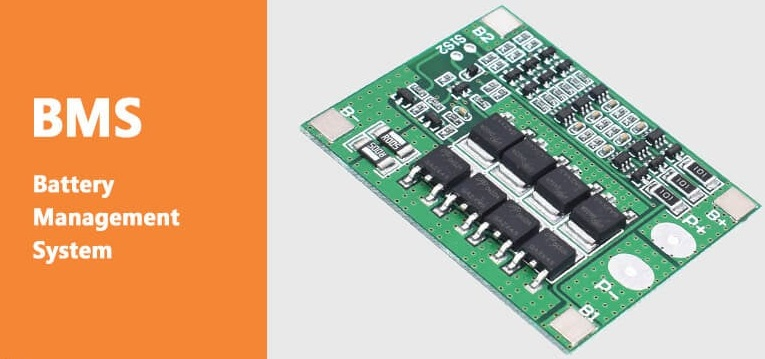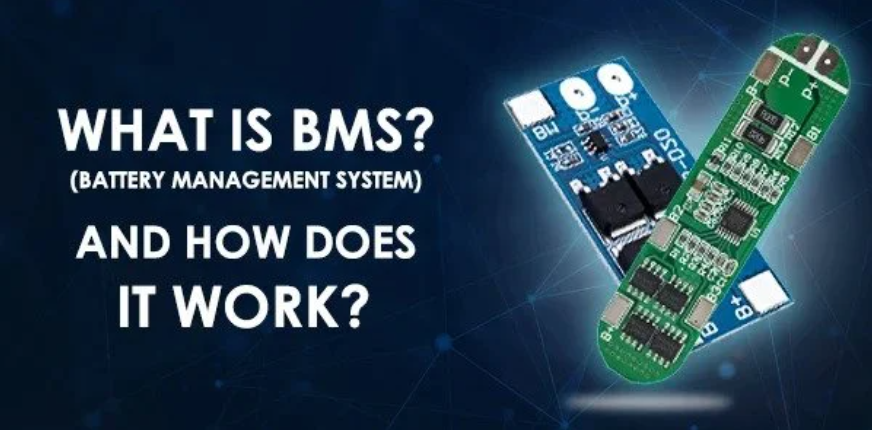Table of Contents
ToggleDefinition of battery management system
Oh, the dreaded ‘Battery Died’ syndrome! Picture this – you’re halfway to an important meeting, and your electric vehicle decides to throw a tantrum. It’s the battery, again! Now imagine a magical device that could’ve prevented this mishap. This, my friends, is where a battery management system, or BMS, steps in to save the day.

A battery management system is the electronic system that manages a rechargeable battery (cell or battery pack), such as by protecting the battery from operating outside its safe operating area, monitoring its state, calculating secondary data, reporting that data, controlling its environment, authenticating it and / or balancing it.
This guardian angel of your battery pack ensures optimum performance and a longer life for your lithium-ion batteries. How, you ask? Well, buckle up, because we’re just getting started.
How do battery management system work?
All right, let’s break down how our silent hero, the battery management system, works its magic.

Electrical Management Protection: Current
First up, Electrical Management Protection: Current.
The BMS stands as a sturdy guard between your lithium-ion battery cells and any unsolicited current. It’s like a bouncer at a club, ensuring only the right current gets through.
By controlling the charging current, the BMS prevents overcharging, undercharging, and any other harmful chemical reactions within your battery pack that could lead to a loss in battery life or a potential thermal runaway.
Electrical Management Protection: Voltage
Next, we have Electrical Management Protection: Voltage.
This feature is like the traffic lights of your battery pack. It maintains the cell voltage and total voltage within a safe range, preventing over voltage that could damage your lithium-ion cells.
Imagine having a monitor for each of your cells, ensuring none of them are too charged or discharged – that’s the kind of tight ship a BMS runs!
Thermal Management Protection: Temperature
Thirdly, we have Thermal Management Protection: Temperature.
You know how it’s never good when things get too heated? It’s the same with your battery cells.
The BMS takes care of the battery’s temperature, ensuring there’s no excessive heat that could kickstart a chain reaction leading to thermal runaway.
In essence, it keeps your batteries cool and composed.
Capacity Management
Lastly, we move on to Capacity Management.
The BMS plays a crucial role in monitoring and managing the remaining capacity of your battery.
It’s like having a personal fitness trainer for your battery, making sure it operates at its best and never runs out of juice prematurely.
And there you have it – the BMS, working behind the scenes, ensuring your battery operates smoothly, safely, and efficiently.
Now, let’s explore the different types of battery management systems.
Types of battery management systems
Let’s take a tour of the fascinating world of battery management systems, where one size does not fit all.
You’ll find different types of BMS architectures out there, each with their own pros and cons.

Centralized BMS Architecture
First, we have the Centralized BMS Architecture.
Picture one central BMS directly overseeing all the battery cells in your lithium battery pack.
It’s like a master chef, keeping a close eye on all the ingredients in one big pot.
Advantages? It’s relatively simple and cost-effective.
However, managing all the cells or battery packages can be a hefty task for only one BMS, especially in large battery systems.
Modular BMS Topology
Next up is the Modular BMS Topology.
Here, several smaller BMS units monitor individual battery modules within the whole battery pack.
Think of it as having a team of chefs, each dedicated to their own dish.
This makes it easier to manage the cells’ voltages, but it can get a bit complex and pricey, as you’ve got more cooks in the kitchen.
Primary/Subordinate BMS
Then we have the Primary/Subordinate BMS, a combination of centralized and modular systems.
Here, there’s one primary BMS which oversees subordinate BMS units, each taking care of their own battery modules. It’s like having a head chef supervising other chefs.
It’s a balance between simplicity and complexity, offering better performance and range at a moderate cost.
Distributed BMS Architecture
Finally, we have the Distributed BMS Architecture. In this case, every single battery cell has its own BMS.
Imagine every ingredient in your kitchen having its own chef. It provides the highest level of detail and control, resulting in optimum performance and safety.
But, as you might guess, having an individual BMS for every cell can be a bit overkill, and the cost reflects this.
And that’s your quick guide to the types of battery management systems. Understanding these can help you choose the perfect BMS for your needs.
But why are BMS so important? Let’s find out in the next section.
The importance of battery management systems
All right, now let’s get into the nitty-gritty: why are battery management systems so crucial?
For starters, a BMS is like the brain of the battery pack. It’s always keeping tabs on the health and safety of your lithium-ion batteries. It’s like having a personal doctor on call 24/7, ready to step in whenever your battery cells show any signs of distress.
Not only does a BMS protect your battery, but it also optimizes its performance. Like a savvy coach, it ensures your battery operates at its peak potential, so you get the most juice out of your lithium battery.
This is key, especially in electric vehicles, where a little extra mileage can make a world of difference.
A BMS also takes care of the thermal management of your battery. It ensures that your battery’s temperature remains in the sweet spot, preventing thermal runaway and potential catastrophic events. You don’t want your battery catching fire now, do you?
Lastly, by keeping your battery in good shape, a BMS indirectly extends the life of your electric vehicles and electronic systems powered by these batteries. It’s a win-win situation.
So, whether you’re a tech geek or a regular Joe, it’s clear as day that a battery management system is vital in our battery-powered world. Now, let’s check out the specific benefits of BMS.
The benefits of battery management systems
Let’s look at the juicy benefits of a battery management system, or as I like to call it, your battery’s personal bodyguard.

Functional Safety
First, there’s Functional Safety.
We’re talking about the BMS actively preventing any loose connections, over voltage, undercharging, or excessive heat, all of which could cause serious damage or even pose safety risks. It’s like having a top-notch security guard for your battery, always on duty.
Life Span and Reliability
Next, we have Life Span and Reliability.
With a BMS, you’re essentially extending the battery life of your lithium-ion batteries. It keeps your battery’s cells in the optimum range, preventing any damaging conditions that could prematurely age your battery.
Your electric vehicle or electronic system becomes more reliable, not having to face frequent battery changes.
Performance and Range
Then, there’s Performance and Range.
The BMS optimizes how your battery operates, ensuring you get the most out of your battery’s capacity.
It’s like having a turbo button for your battery, pushing your electric vehicle’s range that extra mile, which is a game-changer for EV drivers.
Diagnostics, Data Collection, and External Communication
The fourth benefit is Diagnostics, Data Collection, and External Communication.
Your BMS is a goldmine of information about your battery’s state. It constantly collects data on factors like remaining capacity, cell voltages, and battery temperature.
This information can be communicated to external systems, allowing for better energy management, planning, and even early detection of potential issues.
Cost and Warranty Reduction
Lastly, we have Cost and Warranty Reduction.
While a BMS may seem like an additional cost, it pays for itself in the long run.
By extending your battery’s lifespan, enhancing its performance, and preventing costly damages, a BMS can reduce overall costs and even lower warranty expenses for manufacturers.
So there you have it – a battery management system is not just a luxury but a necessity, delivering a host of benefits that keep your batteries and systems in check.
Now, let’s see how battery management systems and Tritek go hand in hand.
Battery management systems and Tritek
And now, I’d like to introduce you to Tritek, the unsung hero of battery management systems. We are Tritek, a manufacturer of intelligent BMS. Our passion lies in ensuring your lithium-ion batteries are operating at their best, safest, and most efficient.
For over 15 years, we’ve been knee-deep in research and development, manufacturing, and sales of BMS. With a team of over 100 experienced R&D personnel, we’re continuously pushing the boundaries of what’s possible in battery management.
Our BMS come in all shapes and sizes. Whether you need a custom low voltage BMS, a home energy storage low voltage BMS, or an energy storage high voltage BMS, we’ve got you covered. It’s like having your very own personal tailor for your battery pack.
Our commitment to quality is unwavering. With a strict quality system, we’ve passed through numerous international certifications like CE, FCC, UL2271, and EN15194. We take pride in ensuring our BMS are built to the highest standards.
We’re not just about making BMS; we’re about manufacturing them on a large scale. With two production sites, we’ve got a strong production and delivery capacity, ready to meet your business needs, no matter how big or small.
But our relationship doesn’t end at purchase. We believe in providing excellent after-sales service. That’s why we’ve set up after-sales service centers in Spain and have plans for customer service centers in the United States and Germany. We’re always here to support you, every step of the way.
In a nutshell, if you’re a business looking to give your batteries the best care possible, Tritek is your go-to place. We understand batteries, we understand business, and most importantly, we understand you. Let’s connect and power up your business together.
And that wraps up our deep dive into the world of battery management systems. Remember, behind every powerful battery, there’s an even more powerful BMS, and behind that BMS, there’s Tritek.
Thank you for reading, and if you have any questions or want to learn more, don’t hesitate to reach out. Here’s to longer battery lives and safer, more efficient power systems!
